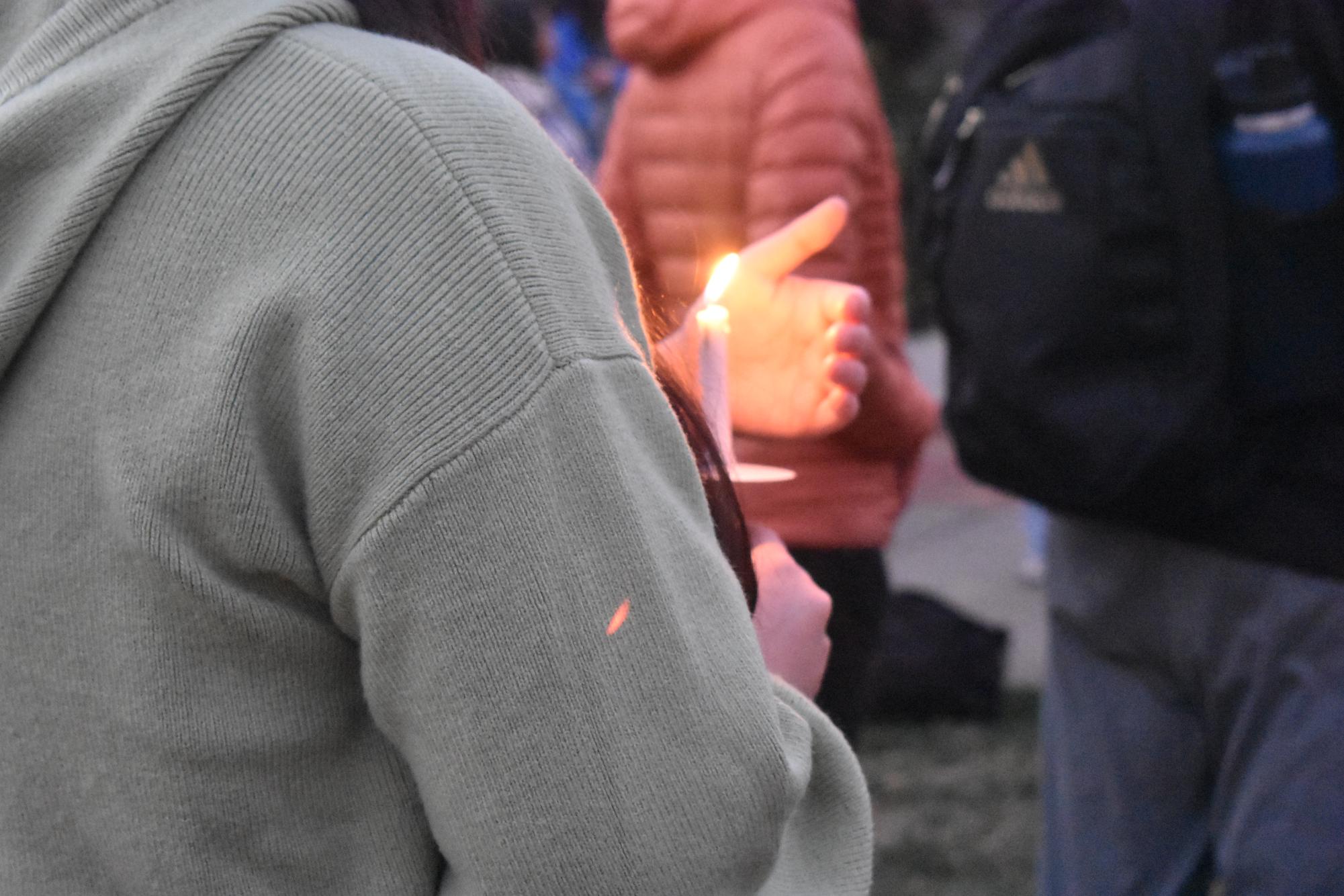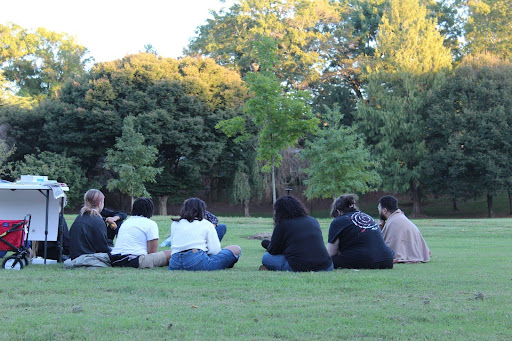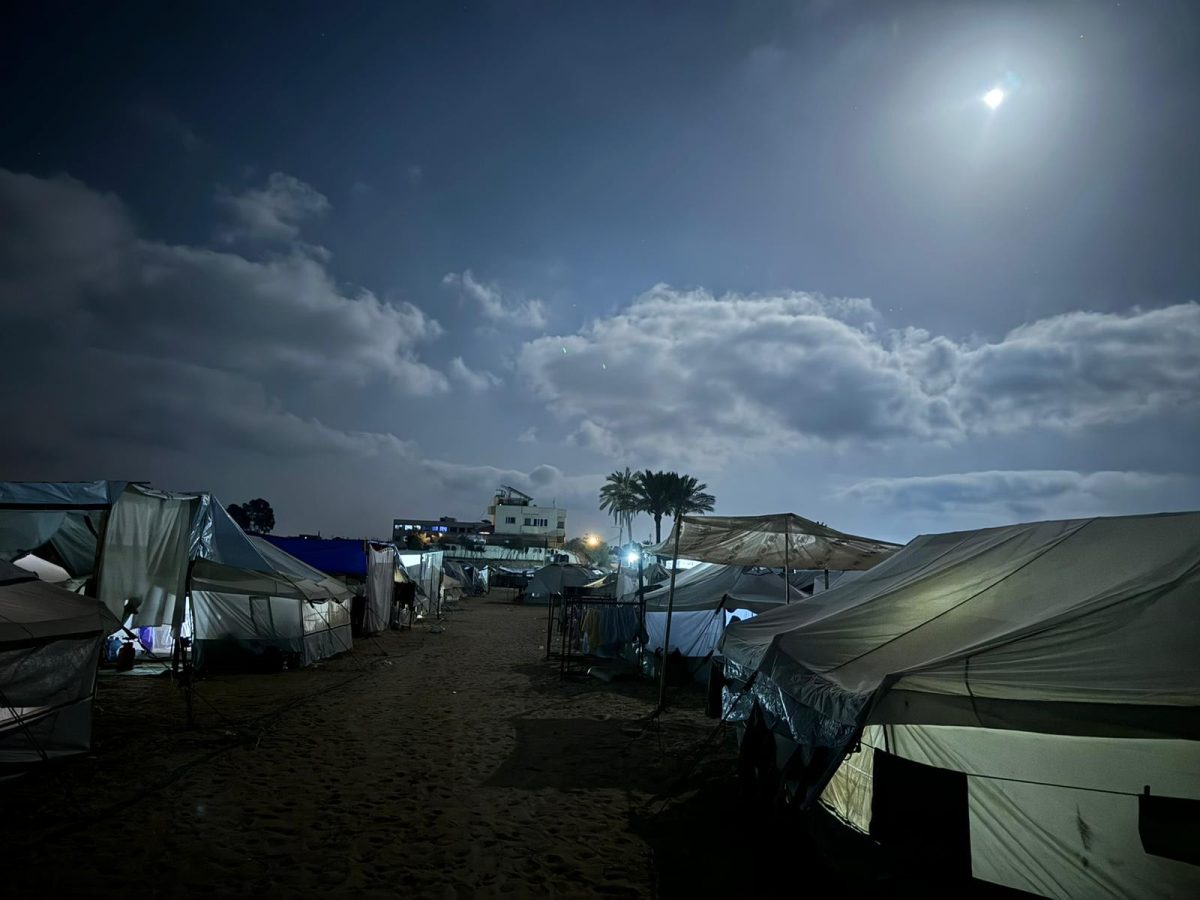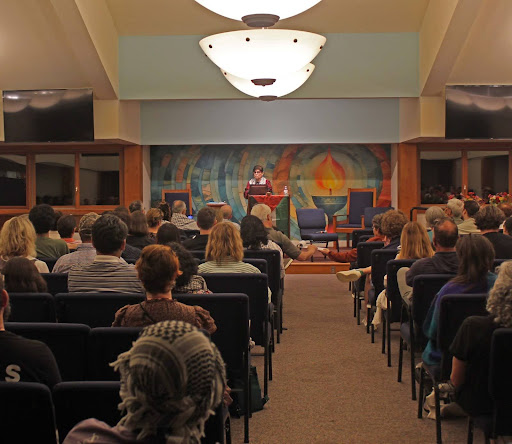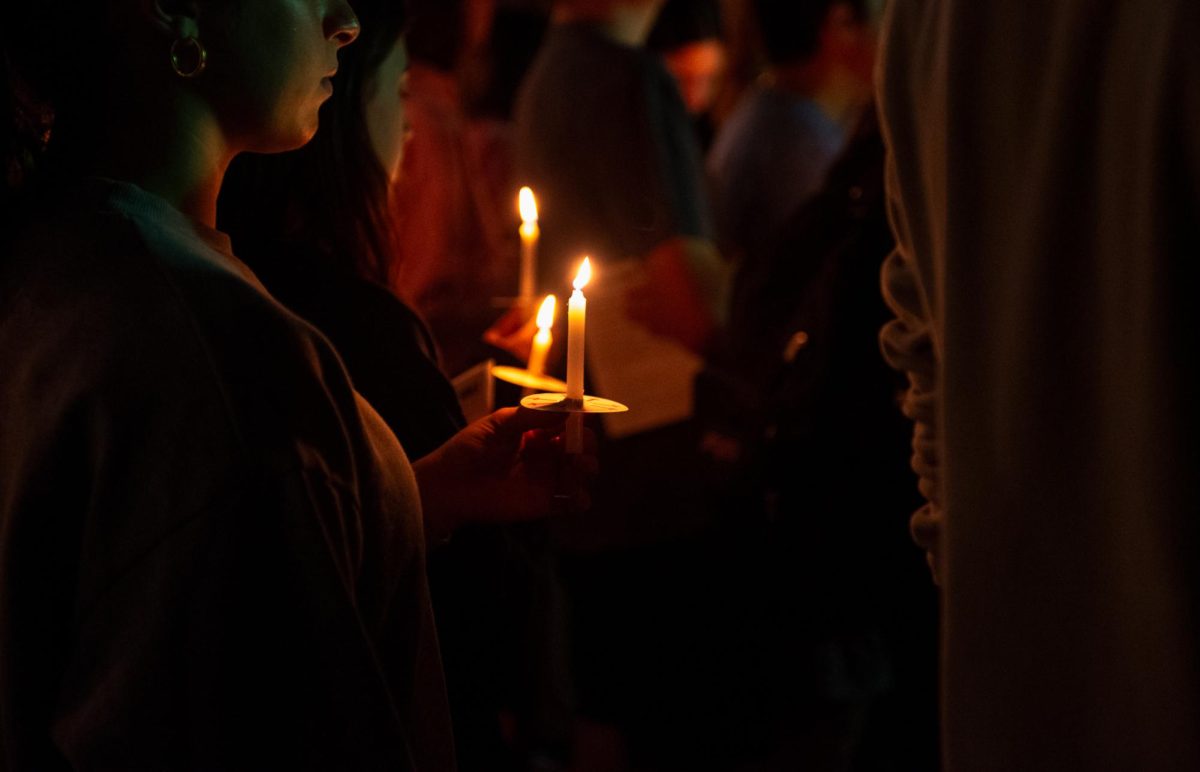Editor’s Note: The Old Gold & Black agreed to grant anonymity and to not take photographs showing the faces of attendees or speakers at the Prayers for Peace vigil unless otherwise given permission by attendees or speakers. The Old Gold & Black spoke with event organizers, who originally requested that no media be present at the vigil, and obtained the Muslim Students Association’s (MSA) consent to report and take photographs. MSA’s request for no media was made out of concern for the safety and privacy of students, who are afraid to speak out on the topic due to the possibility of verbal, physical or online harassment.
The Old Gold & Black has made these decisions as part of its commitment to the journalistic principles of “do the least harm” and “seek truth and report it.”
About 100 people, including Wake Forest students, faculty and administrators, gathered on Manchester Plaza Wednesday evening to pray and remember the Palestinian and Israeli lives lost in the Israel-Hamas war. Speakers also called for an end to what they said is genocide and ethnic cleansing in Gaza.
“You can be sad about Israeli deaths and Israeli loss of life and also be sad about Palestinian deaths and Palestinian loss of life,” said an event organizer, whom the Old Gold & Black is granting anonymity due to their concerns about safety. “You can also just take a moment to pause and recognize the fact that, combined, there are probably over 10,000 people dead within three weeks.”
The flyer for the event, which was organized by the Muslim Students Association (MSA), said that “while our focus is on Palestine, this vigil is extended to all those affected by the ongoing crisis.” The organizer also said they felt Wake Forest was lacking a space to express student beliefs and views.
“We wanted to provide a safe space for Muslim students and any other students on campus, including Arab students, people of color and anyone feeling any sort of connection or pain to what’s happening right now,” the anonymous organizer said.
Organizers took precautions to preserve the anonymity of attendees in the wake of harassment campaigns against those expressing support for Palestine at American college campuses, including Harvard and Columbia. Flyers for the vigil said that taking photos and videos, as well as the presence of media, were not allowed at the event (the Old Gold & Black spoke with the MSA ahead of the event and received its consent to cover and photograph the event). Some attendees also wore hoods and masks to protect their identities.
The MSA said they received support from the university in planning the event and organizing security. Dr. Matt Clifford, associate vice president for campus life and interim dean of students, was present at the event and helped light candles.
“We’re trying to be extraordinarily sensitive to what our students are experiencing at Wake Forest, especially regarding antisemitism and Islamophobia,” he said. “They’re, unfortunately, on the rise, especially on college campuses, and we are not immune to that.”
Thousands of miles away from Wake Forest, the Israel-Hamas war continues to rage. On Oct. 7, the Palestinian militant group Hamas carried out a surprise attack on Israeli towns bordering the Gaza Strip — a Palestinian territory that Israel and Egypt have blockaded for the past 16 years. (Editor’s Note: The Old Gold & Black follows AP Style guidance, which is to refer to Hamas as a militant group.) The attacks resulted in the death of more than 1,400 Israelis. In response, Israel conducted air strikes and sent troops into Gaza. According to the Gaza Health Ministry, more than 9,000 Palestinians have been killed in the war.
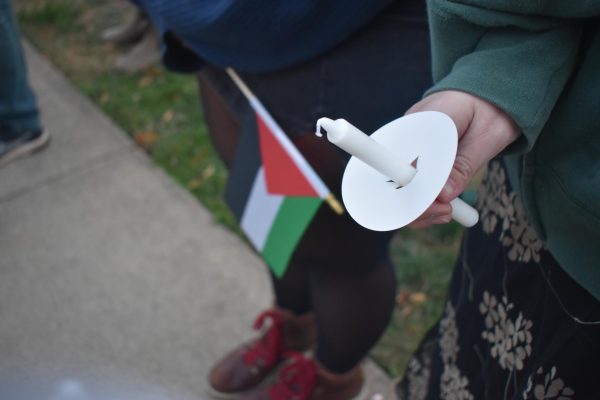
The vigil
A podium on the stage on Manchester Plaza displayed the Palestinian flag, and small Palestinian flags and candles were passed out. Attendees prayed together on prayer rugs behind the podium after former Muslim Life Chaplain Naijla Faizi and an anonymous speaker gave speeches. Faizi told the Old Gold & Black that she formally resigned from her position at Wake Forest earlier this semester for personal reasons unrelated to the Israel-Hamas war.
Senior Hasan Pyarali attended the vigil to grieve and remember innocent lives.
“I came to the event because I’ve been feeling a lot of pain recently, and I know a lot of my friends and family have as well,” Pyarali said. “I thought this would be a good way for my friends at Wake Forest to come together and express solidarity for people who are dying right now who are innocent.”
Faizi recited an Islamic funeral prayer to honor those who have been killed in the Israel-Hamas war and the poem, “To Our Land,” by Palestinian poet Mahmoud Darwish.
“I pray for peace and an end to this cycle of violence — for Palestinians and the Israeli people,” Faizi said during her speech.
Her speech was followed by a speaker who condemned the bombing of Gaza and said that not all Israelis and Jews agree with the Israeli government’s actions toward Palestine.
“One can simultaneously empathize with the trauma and anger Israelis and the broader Jewish community [have been] feeling since Oct. 7,” they said. “We cannot allow that anger to blind us to justifying the same trauma and violence being inflicted on Palestinians on a massive scale.”
The speaker also said that they do not call for harm on any Israeli citizens or members of the Jewish community.
“We should not be labeled antisemitic when we criticize the policies and actions of a government or the government entities and how it has bombed Gaza and how it has handled the occupation for decades,” the speaker said.
Freshman Adam Hammock attended the vigil to support those who are hurting.
“It’s important for me to see that pain. I’m compelled to at least support or stand with people who feel that pain — to be human in that regard,” he said.
The vigil ended with a call to prayer at sundown, at which point many attendees gathered on stage to pray together.
Students voice safety concerns
Promotional materials for the Prayers for Peace vigil stated “no media, videos, photos or recordings allowed.” The anonymous organizer said this was requested to protect students’ identities. A flyer for the vigil also encouraged attendees to “dress for safety.” While many attendees were identifiable, others were wearing hoodies and masks to cover their faces.
“If your face goes up [online], it’s 2023, people can really easily find out who you are, where you live, etc.,” the anonymous organizer said. “Those are some of the security concerns — more specifically, people on campus knowing who you are, knowing that you’re supporting this position or that you’re of a certain background.”
The organizer also said that students have voiced fears of losing job offers because of their opinion on Palestine.
The organizer said the request for no media was also made so that the event would not be misrepresented.
“We didn’t want people to phenomenalize or sensationalize it, but just to take a moment to pause and remember the dead,” they said. “The second thing is we didn’t want anyone’s faces being put up online, because people coming out and then having a picture taken of them there doesn’t allow them to tell anything about their side of the story — why they were there, what they’re feeling.”
Pyarali attended the event and said that while he initially did not understand the request for no media at the vigil, he came to understand it as he spoke to other students.
“I believe it was important for a lot of students there,” Pyarali said. “There’s a lot of organizations and people out there that seek to dox students like this. That’s why you saw a lot of students with masks. Because even though there was a media ban, people were still recording, with the intent of distribution by the way.”
At this time, the Old Gold & Black cannot confirm whether recordings of the vigil have been distributed.
The Old Gold & Black spoke to five freshman students observing the event behind the crowd and filming with their phones. All of the students told the Old Gold & Black they were Jewish. One of the students, whom the Old Gold & Black granted anonymity because of their safety concerns, said they felt like it was their responsibility to attend.
“I felt that as a Jew, it was my responsibility to be here and attend, to absorb the information and also share any information or actions that were taken here, in case anything was antisemitic or hateful,” they said. “I feel as though placing a media ban eliminates that possibility and is therefore just disrespectful and ignorant.”
The freshman student said while the vigil’s speakers were peaceful and respectful in tone, some of the words and phrases they used were “extremely disrespectful and hateful.”
“Just to throw out a few examples — genocide, ethnic cleansing — using these terms in the context of what’s happening today is not only hurtful for me and my Jewish community here, but for Jews all around the world,” they said.
Campus police were present at the event. Chief of Police Regina Lawson said that the Wake Forest University Police Department has not received reports from students with specific concerns regarding personal safety as it relates to the Israel-Hamas war.
“We are paying close attention to what is happening on other campuses and around the country,” Lawson said. “We are prepared to respond to any concerns or incidents. Anyone with any concerns is encouraged to immediately contact UPD.”
Lawson is referring to rising tensions at universities in the U.S. Although many protests have been peaceful, some have devolved into clashes, and there have been instances of violence.
“Doxxing trucks” with a digital billboard displaying the names of students who signed a Palestinian solidarity statement parked at Harvard and Columbia. To dox means to publish someone’s personal, identifiable information, such as an address, usually on the internet. Closer to home, Chapel Hill Police are investigating an alleged assault of a Muslim person by someone who was allegedly wearing an Israeli flag.
Instances of violence and doxxing around the country have created a culture of fear around speaking out about the Israel-Hamas war at Wake Forest. The Old Gold & Black has previously reported that Muslim students fear speaking out because of doxxing and public blacklisting. Blacklisting, in general, refers to being excluded, usually from opportunities such as jobs or graduate schools. Provost Michele Gillespie previously told the Old Gold & Black that the Provost’s Office is “aware that some students, particularly Jewish and Muslim students, are feeling that their psychological safety has been threatened.”
Vice President for Campus Life Dr. Shea Kidd Brown also attended the vigil and acknowledged the challenge that international crises, especially those that personally impact students, present to a college campus.
“Our Muslim and Jewish students may have different lived experiences and perspectives, but their human response to crisis is similar,” Kidd Brown said. “They’ve expressed fear, grief and the desire for physical and psychological safety, and they need support, community and space to experience their very real emotions.”
When faced with pain, Pyarali said that it is important for people from all walks of life to come together.
“I was so happy today because I saw my friends from every walk of life, no matter what their religion was, what the color of their skin was, everyone was there today,” Pyarali said. “I couldn’t be more thankful to have friends like that, and to have a community like that, which comes together. Because that’s not a common thing, that’s a very special thing.”
Christa Dutton and Maryam Khanum contributed reporting to this article.
This story is part of the Old Gold & Black’s ongoing coverage of the Israel-Hamas war and its effects on Wake Forest’s campus. Our previous coverage, in news and opinion, is available here.

